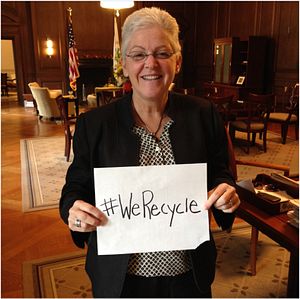As dense smog over Shanghai rekindled international interest in China’s pollution problems, U.S. Environmental Protection Agency Administrator Gina McCarthy headed to China for a four day visit. According to a press release from the EPA, McCarthy’s main goal is “to discuss US-China cooperation on air quality, climate pollution and environmental issues.”
For its part, China seems eager for help dealing with its environmental issues. On Monday, the same day McCarthy arrived in China, the National Development and Reform Commission reported that China is ill-prepared to deal with the effects of climate change. “Climate change is already a serious threat to food, water, ecological and energy security, and to people’s lives and property,” the report said, noting that “although our work at dealing with climate change has achieved some successes … there are many weak links in our work.”
Against this gloomy backdrop, McCarthy’s optimistic approach must have seemed a breath of fresh air. In a speech at Tsinghua University, McCarthy acknowledged the “significant pollution challenges” China faces, but pointed out that, “not too long ago, the U.S. faced similar challenges.” McCarthy expanded on this idea in an article she wrote for the Huffington Post: “China is facing severe air quality challenges. In the U.S., we can speak from experience, because not too long ago it was our cities — like Los Angeles and New York — that were shrouded in blankets of pollution similar to those we see enveloping Beijing and Shanghai today.”
So what specifically does the U.S. have to offer China? Minister Zhou Shengxian, head of China’s Environmental Protection Ministry, sought technological help, which McCarthy did not address in great detail. However, she did point out areas where U.S. technology is already being used in China’s environmental clean-up efforts. McCarthy wrote in a blog post on the EPA website about her visit to the Beijing Environmental Protection Bureau air monitoring center, which she described as “home to state-of-the-art equipment that provides real time reporting.” This “state-of-the-art equipment” was made in the U.S., as McCarthy pointed out in her Huffington Post piece.
Beyond technological sharing, McCarthy offered broader advice to her counterparts at the Ministry of Environmental Protection (MEP): “Continued progress will require the kind of national, regional, and local air quality management infrastructure that the U.S. uses to achieve strong public health protections here at home.” In other words, to fully fight pollution, the MEP needs to bulk up its oversight abilities at the national, regional, and local levels.
This is exactly where MEP struggles the most. Today’s MEP is only five years old, having replaced the State Environmental Protection Agency in 2008. The young ministry faces enormous challenges in getting strict environmental regulations passed, and an even greater challenge in enforcing them. For example, in a recent article, Xinhua quoted a Chinese official who believes that many Chinese companies simply “shut down their pollution treatment facilities to cut costs.” Without the power to enforce its standards, the MEP can do little to stop pollution.
Recognizing these challenges, Minister Zhou Shengxian told Chinese state media in July that China’s Ministry of Environmental Protection was one of “four major embarrassing departments in the world.” He defined the problem as a lack of coordination. Overlapping responsibilities between the MEP and other agencies such as the State Forestry Commission, the Ministry of Water, and the National Development and Reform Commission make it difficult to put policies into action. The Chinese government is expected to address this by strengthening the MEP during next year’s round of government departmental reform.
It’s ironic that in China, where there is nearly unanimous agreement that climate change is occurring and caused by human pollution, the MEP struggles. Meanwhile, in the U.S., a Pew Research Center poll found that only 40 percent of Americans view climate change as a “major threat.” In addition, the EPA even faces periodic efforts by the U.S. Republican Party to scrap the organization altogether. Still, the reason the EPA raises controversy in the U.S. is precisely because it is effective. It’s politically difficult to pass new EPA regulations, but once in place those regulations are enforced. Otherwise, there would be no controversy over the burden these regulations place on businesses.
Many environmentalists bemoan the inaction of the U.S. government, especially Congress, on the problem of climate change. China’s government, on the other hand, has recently stepped up its commitment to environmental protection, causing a slew of rather envious articles in Western media (like Slate’s “Seven Reasons Why China May Be the World Leader in Fighting Climate Change”). Still, while China’s newfound commitment to reducing emissions and pollution is laudable, the question of enforcement remains an issue. Here, the EPA’s clout does hold valuable lessons for the MEP.
As McCarthy noted in the Huffington Post, there is great potential for U.S.-China cooperation on environmental issues: “Yes, there’s economic competition between us — but we share the same planet. The threats of air pollution and climate change don’t respect international boundaries. We face them together; we must find a way to fight them together.” Cooperation means sharing experience as well as technology. U.S. air monitoring equipment is well and good, but the lesson of the EPA’s survival despite decades of political in-fighting could be even more useful for China. For China’s new environmental protection strategies to mean anything, the MEP will have to grow some teeth.

































